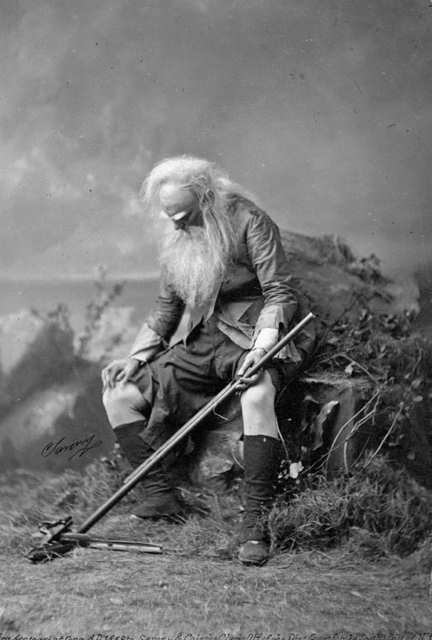
And he's right, so here it is!
Traditional English folk songs can be history (a little mossy, a little mutated), myth retold (look, everyone really wants to go to Elfland, if they can just figure out a way to come out alive), news (remember when Alisoun got shot cause they thought she was a swan?), and the occasional unique idea (I'll let you know when I find one). They're all sung in a minor key, and can be very haunting. That's why they're still being sung. And why I still listen to them.
But let's break down these categories a bit:
Most of English folk songs have people dying of a broken heart. "Barbara Allan" is actually unusual, in that it's the lass that's hard-hearted (although she does die for her dead lover in the end: "my true love died for me today, I'll die for him tomorrow"). Most of the time it's the lass that got knocked up on velvet green and was abandoned who dies of sorrow (and sometimes childbirth). But there's a lot of broken hearts, and there still are. For one thing, it's hard to get to a ripe old age and never have your heart broken once. And sad songs are cathartic. There's nothing like a good cry, especially when accompanied by alcohol and maybe a group sing-along in the bar...
The amazingly large number of deaths by drowning makes just as much sense. Drowning was actually a major cause of death in the Middle Ages because:
(1) People drank a lot. Beer in the morning, beer at midday, beer at night. Granted, a lot of it was small beer, but there wasn't any caffeine in those days, and the water wasn't safe to drink and they knew it. And even if it was, they were still going to drink beer. Or wine. And if anyone offered them some whiskey, well, they wouldn't turn it down.
(2) Almost every village and every city was built along water, because water was necessary for cooking, transportation (barges were the equivalent of modern semis), power (mills), and the occasional cleaning. This meant there was lots of water to fall into while drinking, either from the banks, bridges, or well. You combine drinking with darkness, and stumbling along home after a few pints at the pub could lead to serious injuries and more drownings. And the Middle Ages were not known for their seating: it was common to sit down on a bridge or the edge of a well and have a long pull at a noggin, and tip back, back, back... Well, watch Oliver Reed in "The Three Musketeers" above...
(3) All that alcohol and water gave you a handy place to toss someone you were tired of, whether it was your spouse, your friend, or the occasional stranger.
Cruel wars... Well, there's still, sadly, a lot of those. Of course, back then men were often pressed into service at sea or land, against their will, or deliberately inebriated by recruiters and signed up, or ran off to join the wars, any wars. Most of the sad songs are about peasant lads being pressed into service and never seen again by their own true love... Sometimes the loved one goes off in search of her true love, but that rarely ends well, either.
NOTE: The most amazing story is a real one: "The Return of Martin Guerre" is about a peasant who went off to the wars, leaving his wife and family, and returned many years later and resumed his life as husband, father, peasant and all was well... until the real Martin Guerre came back from the dead, years after that, and booted the imposter out and up onto the gallows. The movie, starring a young Gerard Depardieu and Nathalie Baye, is magnificent.
Execution... not so often, and usually NOT for being a highwayman or a footpad. Although there are lots of serial killers, then and now. And there are songs about the victims of said serial killers, such as "Reynardine", in which the lass is led over the mountains by a serial killer werefox cannibal "whose teeth did brightly shine".
But most are about escaping Bluebeard types in the folk songs, legends, stories, and fairy tales: a man who marries successive wives and kills them all, except the last who somehow figures a way out of it. My favorite version is Grimm's "The Robber Bride". I was fascinated as a child by the three glasses of wine the Robber gave his victims (one white, one red, and one yellow, which knocked them out), grossed out by the dismemberment (read it yourself HERE), and cheering when the Bride cleverly exposes him at the wedding feast, and he and all his band are executed.
Another version of nailing Bluebeard is a very old folk song called "The Outlandish Knight". Flora Thompson quoted hugely from this in her memoir "Lark Rise to Candleford", because she heard it almost every night from the local inn, as old David sang it to wind up the evening's drinking:
"He turned his back towards her
To view the leaves so green,
And she took hold of his middle so small
And tumbled him into the stream.
And he sank high and he sank low
And he sank high and he sank low
Until he came to the side.
'Take hold of my hand, my pretty ladye,
And I will make you my bride.'
'
Lie there, lie there, you false-hearted man,
Lie there instead of me,
For six pretty maids hast thou drowned here
And the seventh hath drowned thee.'
"The Outlandish Knight" is a variation of "Lady Isabel and the Elf Knight". (See Steeleye Span's version.) There's a lot of songs about Elf Knights, Elf Queens, and elves in general, and all I can say is, you don't want to go there.
Except you do. Because it's an incredible place, full of mystery, beauty, glamour, and as long as you're there you'll never get old. And who knows? You may be as lucky as Thomas the Rhymer, who returns with the gift of prophecy and poetry...
Nonetheless, it can end badly, unless your true love comes to fetch you, like in Tam Lin ... Otherwise... I'd stay home.
And now we come to the last two:
"Wandered off, lost in the woods, and died". One variant is the Babes in the Wood, a/k/a Hansel and Gretel, who were either murdered or driven out to starve to death in the woods... and do. (The frequency of these tales can make you wonder about human nature. Then again, having just seen this on the news, maybe not...)
 The other variant is Rip Van Winkle, who drank the wrong wine / ale given to him by ghosts / elves / trolls, falls asleep, and awakens a hundred years later, which means that all his generation thought he died. While Washington Irving based Rip Van Winkle on a Dutch story, "Peter Klaus", it's a very old legend. The first go-round apparently was when, in the 3rd Century BC, the Greek historian Diogenes Laertius told the story of a shepherd, Epimenides of Knossos, who fell asleep in a cave and woke up decades later. But it might well be older than that. There are tales of long sleepers in the Orkney Islands, where a drunken fiddler meets up with trolls, in Ireland, China, Japan, and India. The Babylonian Talmud tells a version of it. Who knows? There are probably some in ancient Egypt and Sumer. This is VERY old stuff.
The other variant is Rip Van Winkle, who drank the wrong wine / ale given to him by ghosts / elves / trolls, falls asleep, and awakens a hundred years later, which means that all his generation thought he died. While Washington Irving based Rip Van Winkle on a Dutch story, "Peter Klaus", it's a very old legend. The first go-round apparently was when, in the 3rd Century BC, the Greek historian Diogenes Laertius told the story of a shepherd, Epimenides of Knossos, who fell asleep in a cave and woke up decades later. But it might well be older than that. There are tales of long sleepers in the Orkney Islands, where a drunken fiddler meets up with trolls, in Ireland, China, Japan, and India. The Babylonian Talmud tells a version of it. Who knows? There are probably some in ancient Egypt and Sumer. This is VERY old stuff.Also (imho) old, old, old stuff is "being mistaken for a swan by a trigger-happy hunter." I totally buy this one. For one thing, swans used to be eaten, in ancient Rome, in Elizabeth times, and on. They were apparently a delicacy. Anyway, hunting them used to be common. And God knows it still happens, although they're not taken for swans anymore. Back in November, 2017, a Pennsylvania woman, out walking her dogs, was shot by a hunter who mistook her for a deer. (Newsweek) November was actually an interesting month for mistaken shootings: another hunter in New York shot a brown pick-up that he mistook for a deer, still another up in Hebron, Maine killed a woman on the opening day of hunting season, and yet another hunter in Oxford, Maine shot a man in the arm. Personally, I'm staying away from the Northeast during hunting season.
Anyway, as you can see, the "Causes of Death in Traditional English Folk Songs" can all still be used today by the modern mystery writer. Our victims can die of a broken heart, accidents, drowning, drinking (or drugs), execution, serial killers, escaping serial killers, Elf land (think cults of all kinds), babes in the wood, and hunting accidents. The technology may change, but the ways, and the motivations, stay pretty much the same.

And you could do worse than to start with folk songs...
I was very prescient, Eve. I think I'm going to open a psychic hotline :-) .
ReplyDeleteBut really, a fun column. And who would have known there's so many great murder mystery ideas in folk songs.
Fascinating stuff and a reminder that the old ballads were the short stories of a pre literate population. I'm another big fan of The Return of Martin Guerre.
ReplyDeleteWhat a fascinating post! And, yes, most of the songs are in a minor key. Moving to America, think of "The House of the Rising Sun," which could also generate dozens of stories.
ReplyDeleteMany of those stories came across the ocean and became bluegrass or straight country, and classic country is less about the music and more about the story. At the risk of sounding like the fuddy-duddy I am, I prefer the older stuff because the lyrics and stories were much stronger than most of today's offerings.
Music, drinking, and violence. What more does a writer need? I'm off to write the story embedded in a blues...
I also copied that English folk songs pie chart from the net and put it in my research folder, sure I can mention something about it later. You really did your research on the real songs.
ReplyDeleteWhen I was a private eye, I spent two painful days perched at a table just inside an Irish pub while surveilling someone who worked across the street and had to listen to the Irish folk tunes again and again. I thought then, this would be a perfect torture method, listening to the story of the sad maiden owho jumped a cliff into Gweebarre Bay to join her drowned lover and about Danny and Mick and Paddy who were hanged by the Bloody British in 1916, even though they were as innocent as the sad maiden of Gweebarre Bay. I did use that surveillance scene my novel THE BLUE NUDE.
Had a great time reading this, Eve. Thanks. I picture a medieval M.E. making pronouncements along the lines of: Death by Wandering, Death by Elfin Misadventure, Death by Swanning, Death by Excessive Bathing, etc...Great fun.
ReplyDeleteGreat stuff, Eve! I especially remember "Polly Vaughn," which was a death-by-swan-resemblance song. But I think it was Irish. Love this!!
ReplyDeleteExcellent post, Eve. Entertaining and well written. For a more modern version of a similar folk song, I found myself picturing the Kingston Trio singing about that poor boy, Tom Dooley (Dula) before I got to the end of your article.
ReplyDeleteI am reminded of that Richard Gere/Jodie Foster movie Sommersby. Always seemed strange to me that two unrelated men could look so much alike, and have their voices sound so alike, that one could successfully pretend to be the other. But as with many things, perhaps I'm overthinking it. Nice column.
ReplyDeleteMe for another fan of "Martin Guerre." And Barb, nice catch. "Sommersby" is actually an American remake of "Martin Guerre." (It's Depardieu at his best! And don't get me started on "Jean de Florette"/"Manon of the Spring"!).
ReplyDeleteSteve's connection of the old world ballad tradition to classic country is spot-on, but don't forget the other side of that modern coin: the blues. Artists like Robert Johnson ("Crossroads" and "Hellhound on My Trail" come to mind), Elmore James, Big Mama Thornton (No relation), Muddy Waters and Willie Dixon sang about modern instances of a whole lot of the same stuff the medieval ballads are about.
And speaking of ballads, for an interesting mixture of modern compositions mixed in with modern adaptations of classic ballads in this vein, I cannot recommend Australian Nick Cave and the Bad Seeds' late '90s album "Murder Ballads" highly enough.
Brian
Wonderful fun. Is that pie chart yours? I like Lady Isabel enough that it appears near the start of my novel SUCH A KILLING CRIME. Two folksingers are arguing over whether you should sing it as written, or edit it so it ends on the punchline.
ReplyDeleteI have written here (or Criminal Brief?) about the many songs in which women are killed by their lovers for getting pregnant - but the subject of pregnancy doesn't appear in the song. It's just understood.
Love the three points about drowning! I remember reading that Henry the 8th's wife Anne B. had a ration of 16 pints a day of beer. That would make anyone fall off the bridge. Great fun post, Eve.
ReplyDeleteBrian, I'm pretty sure many of the old blues songs are also based on true stories. I know "Stagger Lee" is a real person, and "Frankie and Johnny" and "Betty and Dupree" probably are, too. All those songs exist in many versions and with slight alterations in names.
ReplyDelete"When The Levee Breaks," originally by Memphis Minnie, was borrowed w/out credit by Led Zeppelin, who also took Howlin' Wolf's "Killin' Floor" and actually won the court battle to change the name to "The Lemon Song." My current WIP is "Back Door Man," a classic Willie Dixon tune first recorded by Howlin' Wolf, too.
We could probably keep this discussion thread going for the rest of the month, couldn't we?Thanks, Eve, for a great source of inspiration in addition to the scholarship.
Thank you, everybody! (I was at a Native American Cultural conference, or I would have responded earlier) This isn't my pie chart, and I have no idea who started it, but isn't it great?
ReplyDeleteI'm glad to see so many fans of "The Return of Martin Guerre" - I love that, and I also love "Jean de Florette" and "Manon of the Springs." Another great Depardieu movie is "Danton," and one of my favorite weird French movies is "La Nuit de Varennes" with an EXTREMELY young Harvey Keitel as Thomas Paine in a coach with a group chasing Louis XVI to his death...
And I LOVE Nick Cave and the Bad Seeds...
You're right, Steve, this could go on and on...